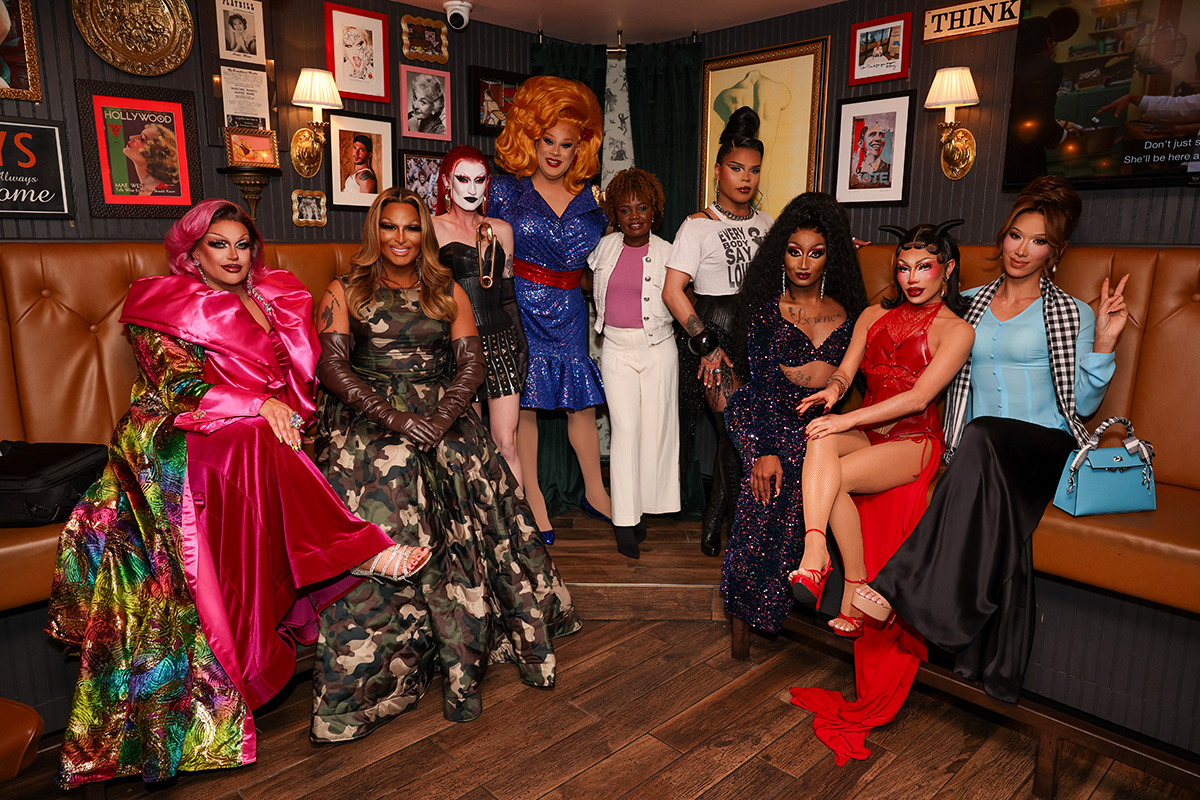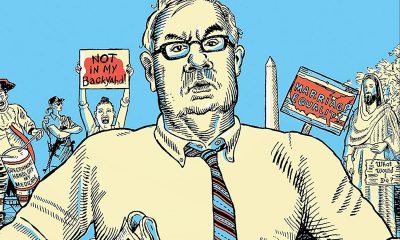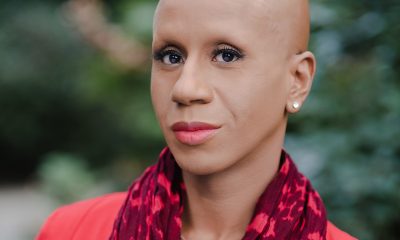Arts & Entertainment
Change of heart
Texas PFLAG mom shares journey of accepting her lesbian daughter
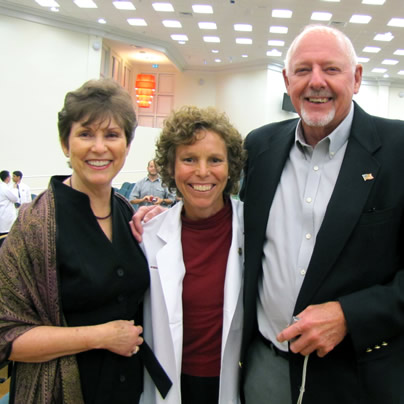
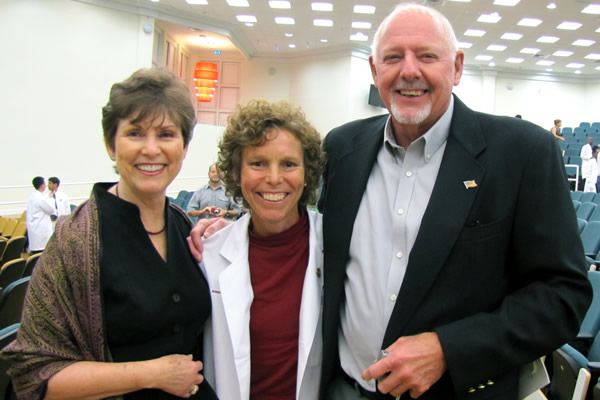
Shari Johnson (left) with her daughter Cholene and husband James in Grenada for Cholene’s white coat ceremony at the start of her medical school program in January 2011. (Photo courtesy Johnson/Changing Lives Press)
Shari Johnson hasn’t thought much about Mother’s Day.
“I really haven’t thought that far ahead,” the long-time Odessa, Texas, mother, grandmother, great-grandmother and conservative Evangelical Christian says by phone from her home. “[My children] pretty much call me if they’re available but I try not to put a whole lot of that unrealized expectation into things. They have their own lives and their own spouses so it’s about them and that’s how it should be and it works for us.”
Johnson might not be thinking much about being a mom this weekend but it’s a topic she’s thought about intently in recent years. Her first book “Above All Things,” published through her daughter Cholene Espinoza’s Changing Lives Press, comes out May 21 and tells of Johnson’s nearly decade-long journey from the time Cholene came out to her by phone as a lesbian in July 2002, to Johnson’s status now as a PFLAG mom (she started a chapter of the gay-affirming group in Odessa) who has retained her faith in the process (order the book here).
The book tells extensively of Johnson’s (a former dental hygienist) rocky early life, her born-again experience in 1971 after two failed marriages, the black-and-white world view that developed out of years of going to Evangelical churches and the painful journey that came from not only accepting her daughter being gay, but the extensive ramifications it had on every aspect of her life.
Though her prayer had initially been that Cholene — an overachiever pilot with years of Air Force and commercial flying under her belt who’s now in medical school — would “be delivered” from homosexuality, Johnson now sees the experience as a catalyst for a radical adjustment to her faith and overall world view. She credits God with her change of heart and writes several times in the book of experiences where she feels the Lord was speaking to her.
“I kept praying that God would change my daughter but I’m the one who ended up being changed,” Johnson writes. “Prior to this time, I thought I had all the answers. Now I’m not even sure that I understand the questions. I viewed life as being either black or white, there was no gray. I avoided anyone who didn’t think as I did. I was a ‘my-mind-is-made-up-don’t-confuse-me-with-the-facts’-type of person.”
But Johnson’s views began to evolve as she realized her daughter’s 2004 marriage to White House correspondent Ellen Ratner was bringing an unfairly different reaction than it would have had she been marrying a man, the hypocrisy she says Christians often exhibit when talking of the supposed sin of homosexuality compared to most other sins (of which Johnson says they often given themselves a “free pass”), and the realization that nobody (especially a Christian) would choose a gay orientation for themselves. These epiphanies had life-changing effects on her.
After years of study and thought, Johnson believes centuries of anti-gay preaching in Christian churches of most varieties comes down to mistakes in scriptural interpretation.
“If we believe that homosexuality is not a choice, then we have to either believe that God is cruel to have played this terrible trick on people and not the loving God we think he is (and that would be a God I could not serve),” she writes in the book. “Or there has to be a mistake in interpreting the scriptures. I chose to believe the latter.”
Though initially highly skeptical, Johnson feels the Lord brought her to a place where she was able to consider that she may have been wrong before.
“I always thought I had sought the will of God in my life before but I realize now what I had often been doing was going to him with my plan and then leaving before I got an answer,” she says. “If people are truly seeking, and all I’m asking people to do is consider that we could be wrong on the way some of these scriptures have been interpreted over the years, but when I finally got around to reading what some of these writers were saying — and I avoided even reading this stuff for the longest time — I realized I needed to start thinking for myself and not just keep blindly repeating what someone else had told me.”
Johnson credits the writings of Rev. Paula Jackson and her work “What Does the Bible Say About Being Gay? — Probably Not What You’ve Been Told,” with helping her expand her theological horizons. That Jackson didn’t write in a “histrionic, blasphemous, in-your-face” manner that “didn’t disregard my point of view,” resonated with Johnson.
“She just presented the facts and lets the reader come to his or her own conclusions,” Johnson writes. “The entire study boils down to this one question: What if we’re wrong?”
Espinoza, who eventually hopes to work as a doctor with Ratner in South Sudan, says it’s important for gay Christians to follow the example of Christ rather than get sidelined in what she and her mother now feel is misconstrued anti-gay theology.
“Christ did not have anything to say about homosexuality but he had a lot to say about love, honor and respect,” she wrote in an e-mail to the Blade. “If we are loving, honorable and respectful in our relationships, I think that reduces a lot of the guilt and self loathing in our heads. We need to separate those who condemn us from the message of love and reconciliation, the message that Christ has brought to us.”
Johnson has become a staunch advocate for LGBT acceptance within Christian churches in the Odessa area. It’s led to a thorny conundrum — she’s tried sharing her story, but often leaves Bible studies and church services feeling she’s been merely placated. She’s at a point now where she can’t stomach anti-gay teaching from the pulpit and has left several churches in frustration. She says gay-welcoming churches in her part of the state are pretty much non-existent.
Johnson has lots of interesting opinions on trends in the modern church, especially with the anti-gay teaching that abounds in the Bible Belt.
She concedes there is a time, whether it’s in the political or religious realm, where it’s OK to respectfully agree to disagree.
“This whole idea of, ‘You have to see things my way,’ that’s never worked in politics, religion or anything else,” she says. “It never worked and it never will. But God gave me a big wake-up call and I would love for other people to not have to go through what I went through. That’s really why I wrote the book.”
She says it’s possible that churches with anti-gay teaching that seem to be thriving — even those led by household-name preachers like Rick Warren and Joel Osteen — might not be as blest as it appears.
“You can’t always assume that God’s blessing a church just because of the numbers,” she says. “People go to church for all sorts of reasons. And when these men have been put on the spot on national television and asked about gay issues and the whole Christian community is sort of collectively holding its breath waiting to hear what they say, they give the accepted answer, but I doubt very seriously that’s what they’re preaching from the pulpit or what they really feel in their hearts.”
But could so many religious teachers have been so wrong for so many years on gay issues? Johnson says yes.
“It’s happened since creation,” she says. “Anytime man gets involved, he manages to screw things up … Anytime there’s been a religious movement that gets started, it’s basically that person’s idea of who God is and what sin is. We tend to think we have all this figured out but you know what the Bible says about our own righteousness — it’s like filthy rags to God.”
But how does someone — especially a gay teen struggling with suicidal thoughts growing up in an Evangelical household — know whom to listen to? Aren’t there well-meaning Christians who simply believe homosexuality isn’t part of God’s plan?
Johnson says that’s where her biggest concern lies — she wants LGBT teens and young adults to have a chance to consider the possibility that their being gay isn’t the sinful curse many churches make it out to be. It’s the main reason she started her PFLAG chapter.
“I don’t have an easy answer for this but we have to have a place for kids to go and hear a different message. They’re not exposed to it at home, they have no place to hear a positive message, they’re in trouble and it has nothing to do with who they really are.”
With so many voices out there claiming to be spokesmen for God or claiming to have heard from God directly, Johnson admits absolute truth is “not always easy to discern.” She says she knows it’s God speaking when she feels compelled to go out of her comfort zone for the greater good.
“I usually know that if it’s contrary to the way I think, it’s usually God,” she says with a self-deprecating tone she uses often in the book. “I tend to line up with the other guy more often in my own thinking. But I can tell if I’m doing something for selfish reasons or whatever, it’s not of God. He does not let up. If it’s something I feel I’m supposed to do … I’m usually thinking, ‘Don’t make me do this.’ You have to learn to set aside the voice of past teaching, past thinking. … For everyone it’s different, but I feel when it’s truly God speaking, it’s a different thing and you know it.”
Celebrity News
John Waters released from hospital after car accident
Crash took place in Baltimore County
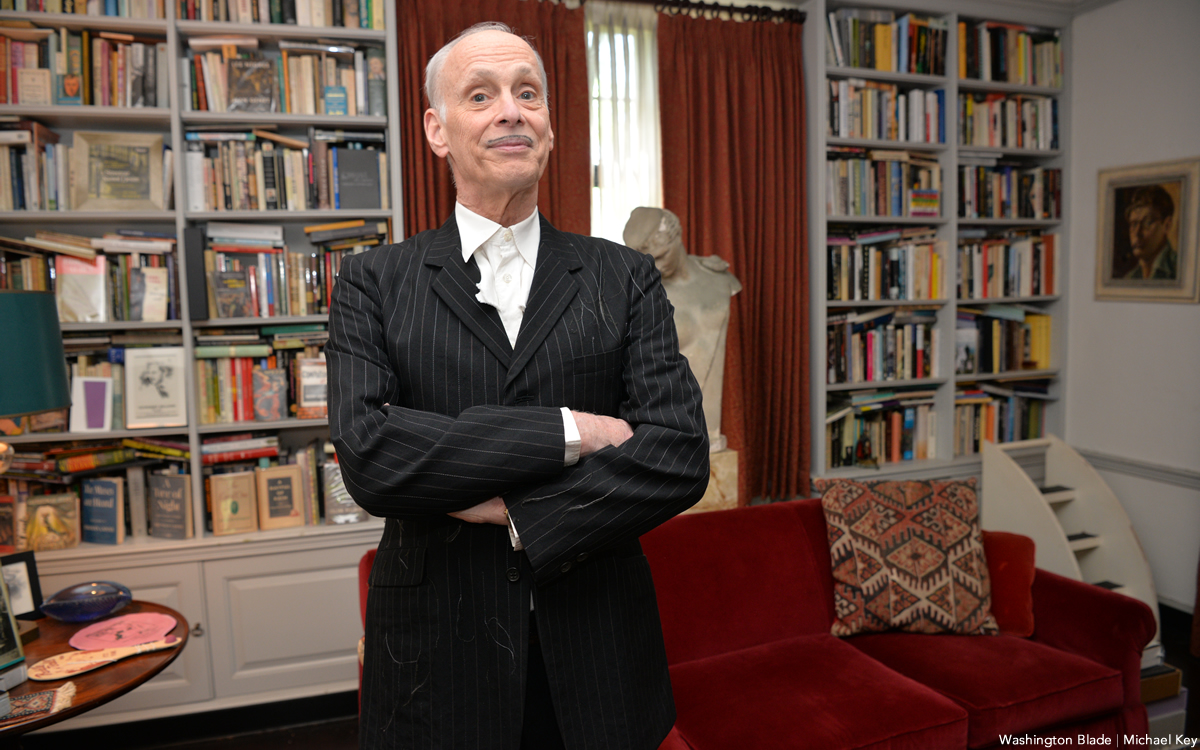
BY TAJI BURRIS | Baltimore filmmaker John Waters was released from the hospital Tuesday morning following a car accident.
The 78-year-old released a statement saying that although he was hurt in the Baltimore County crash, he did not sustain major injuries.
The rest of this article can be found on the Baltimore Banner’s website.
Arts & Entertainment
Washington Blade’s Pride on the Pier and fireworks show returning June 8
The annual Pride on the Pier Fireworks Show presented by the Leonard-Litz Foundation will take place on Saturday, June 8 at 9 p.m.

The Washington Blade, in partnership with LURe DC and The Wharf, is excited to announce the 5th annual Pride on the Pier and fireworks show during D.C. Pride weekend on Saturday, June 8, 2024, from 2-10 p.m.
The event will include the annual Pride on the Pier Fireworks Show presented by the Leonard-Litz Foundation at 9 p.m.

Pride on the Pier extends the city’s annual celebration of LGBTQ visibility to the bustling Southwest waterfront with an exciting array of activities and entertainment for all ages. The District Pier will offer DJs, dancing, drag, and other entertainment. Alcoholic beverages will be available for purchase for those 21 and older. Local DJ’s Heat, Eletrox and Honey will perform throughout the event.
3 p.m. – Capital Pride Parade on the Big Screen
3:30 p.m. – Drag Show hosted by Cake Pop!
9 p.m. – Fireworks Show Presented by Leonard-Litz Foundation

The event is free and open to the public. The Dockmasters Building will be home to a VIP experience. To learn more and to purchase tickets go to www.prideonthepier.com/vip. VIP tickets are limited.
Event sponsors include Absolut, Buying Time, Capital Pride, DC Brau, DC Fray, Burney Wealth Management, Infinate Legacy, Leonard-Litz Foundation, Mayor’s Office of LGBTQ Affairs, MISTR, NBC4, The Wharf. More information regarding activities will be released at www.PrideOnThePier.com
a&e features
‘RuPaul’s Drag Race: All Stars’ cast visits D.C.
8 queens vie for $200,000 prize for charity in new season, premiering May 17

Donning sparkling and star-studded red, white, and blue attire on a gloomy, humid D.C. Monday, the cast of the latest “RuPaul’s Drag Race All Stars” season sashayed on the National Mall to promote the reality show’s ninth season.
This upcoming season is different than those in the past — eight queens are competing for a donation of $200,000 for the charity of their choosing, rather than a personal cash prize.
Several cast members noted how it felt important to visit the nation’s capital, being authentically themselves and wearing drag. Nina West, who competed in season 11, likened drag to armor.
“We’re here during a really specific time in history, that’s, I would say, markedly dark,” she told the Blade at the steps of the Lincoln Memorial. “And there’s an opportunity, as drag has always done, which is for our community as specifically LGBTQI+ people, to stand in our truth and be wonderful — like guardians and fighters for our community.”
She’s competing for the Trevor Project, which is focused on suicide prevention and crisis intervention for young LGBTQ people. This season’s pivot to compete for charity made Nina West want to come back on the show for the All Stars season. She’s been offered the spot two times before this, she said, and this twist aligned with what she wanted to do.
Several of the other queens mentioned that it’s an honor to be featured in this season, including season 5’s Roxxxy Andrews. She also competed in two subsequent All-Stars seasons.
She chose the organization Miracle of Love, which provides HIV/AIDS prevention programming and assistance in central Florida. It’s a smaller, more local organization, which is why Roxxxy Andrews chose it. She wants to make its work more nationally known. Also, vying to win during a charity season makes the competition feel more rewarding, she said.
Plastique Tiara of season 11 also noted it’s different competing for charity. She’s competing for the Asian American Foundation, which launched in 2021 in response to the rise in anti-Asian hate and aims to curb discrimination and violence through education and investments in nonprofits.
“It’s more competitive because then you’re fighting not just only for yourself, but your ideas and the things that you love,” she said.
Vanessa Vanjie of seasons 10 and 11 agreed that competing for charity adds a bit more pressure — she chose the ASPCA. And as onlookers near the Lincoln Memorial took pictures of and with the queens, she said she was relieved.
“I was a little bit worried somebody would yell some slurs at us,” Vanessa Vanjie said. “Nothing happened. Everybody came to take pictures like Santa Claus in the middle of the mall.”
There’s a range of contestants from different seasons for this round of All Stars. Some queens hail from recent seasons, but Shannel competed on the show’s first season. To be a part of this new season is surreal, she said.
She’s competing for the Anxiety and Depression Association of America, which she has a close tie to. She’s dealt with anxiety her entire life. The association is focused on increasing awareness and improving diagnosis and treatment.
“I always felt like I just wasn’t normal, sadly,” she said. “And so now being able to be able to do this season and to get back to that organization is like amazing to me.”
Gottmik, from season 13, is competing for Trans Lifeline — a nonprofit providing advocacy, a hotline and grants created by trans people, for trans people. Being able to do drag and give back is the “perfect scenario,” Gottmik said.
Gottmik was the first openly trans man on Drag Race, which was overwhelming when first on the show. Gottmik felt pressure to be the “perfect example,” but later realized that they didn’t have to worry so much.
“I just want to show people that trans people are real people. We can express ourselves however we want to express ourselves, through drag, through whatever it may be,” Gottmik said.
The new season will be available to stream on Paramount+ on May 17.
